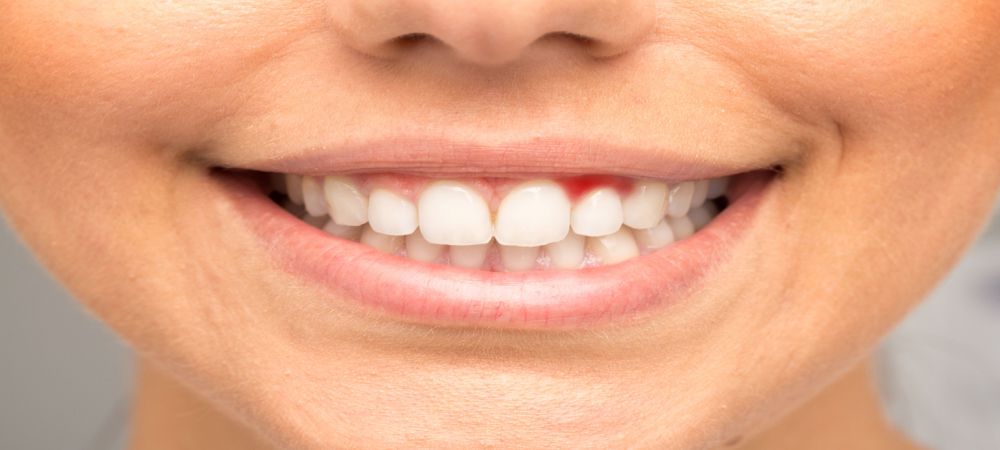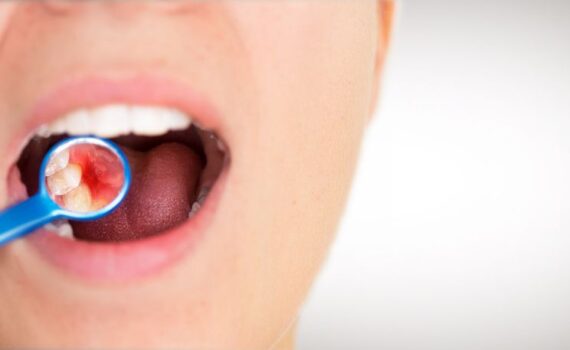
The author of the article
Boris Lipovetskiy, DMD, 31 years experience
Gum disease is the most common dental problem that 7 out of 10 people are going to experience at one point in their lives, according to the Canadian Dental Association (CDA). Because the onset and early stages are painless, some people tend to underestimate this illness, thereby letting it progress and turn severe. You can, of course, take measures to prevent and mitigate gum disease.
What Is Gum Disease?
Simply, gum disease is an infection of the tissues that surround and hold your teeth in place. Usually, it occurs because of poor or not regularly brushing or flossing. As a result, a biofilm builds up and hardens into plaque.
There are two kinds of gum diseases, but not necessarily distinct. Instead, it is a progression from one to the other.

Poor dental hygiene is the most typical cause of gum disease. It begins as an inflammation of the gums and tissues around the teeth that appears red, swollen, and bleeds easily when brushed or flossed.
How does gingivitis start?
If a person does not brush and floss teeth regularly, the mixture of food debris, saliva, and bacteria leads to the formation of a biofilm, which eventually turns into plaque.
Dental plaque sticks to the surface of teeth and needs to be removed. If brushing teeth and flossing does not remove them entirely, the ones left behind mineralizes, turning into tartar.
Because of its hardness and toughness, tartar can no longer be removed at home. It is for this reason that a regular visit to a dental clinic is recommended. Only dentists can clean the teeth while also removing the tartar.
Unsightly is the least of concerns when tartar is allowed to build up. It also becomes the site where bacteria proliferates. These microorganisms, in turn, irritate the gums and tissues, causing gingivitis.
Gingivitis, in more ways than one, should serve as a warning of a more serious disease. If untreated, periodontitis could develop.
How does gingivitis develop into periodontitis?
When not taken care of, plaque spreads and grows beneath the gum line. The bacteria that thrive produce toxins that not only irritate the gum but also stimulate an inflammatory response. In other words, they cause the body to defend itself against itself. Consequently, the surrounding tissues and bones break down and eventually get destroyed.
Periodontitis causes the gums to separate from the teeth. The infection spreads into the pockets – the spaces between the gums and the teeth. These pockets, in time, deepen and result in more damage.
Although the symptoms of the damage are mild, it still results in teeth loosening and requiring removal.
Periodontitis comprises numerous forms, some of the more common ones are:
Aggressive Periodontitis. Rapid attachment loss, bone destruction, and familial aggregation among patients who are healthy.
Chronic Periodontitis. Inflammation of the supporting tissues of the teeth, progressive attachment, and bone loss can occur at any age but mostly among adults. It is the most common form of periodontitis.
Periodontitis as a Manifestation of Systemic Diseases. Systemic conditions including, but not limited to, heart disease, respiratory disease, and diabetes can cause this gum disease.
Necrotizing Periodontal Disease. A gum disease characterized by necrosis of gingival tissues, periodontal ligament, and alveolar bone. The wounds are more common among people who suffer from HIV, malnutrition, and immunosuppression.
Related article: How Do You Make Your Teeth White and Smile Confidently?
What Causes Gum Disease?

Bacterial growth on the gums and teeth is the primary cause of gum diseases. These microorganisms thrive in a clear, sticky substance called plaque. They mainly feed on sugars in foods and beverages, while leaving toxins. Not only do your gums get irritated but they also swell and bleed when brushed.
Neglecting dental hygiene further worsens the condition. The plaque that forms and hardens over time. They turn into calculus (more commonly known as tartar). The gum disease now progresses to become a periodontal disease in which the gums separate from the teeth.
What makes you susceptible to contracting gingivitis or periodontal diseases?
- Poor dental hygiene and not getting teeth cleaned by a dentist.
- Smoking or chewing tobacco.
- Family history of gum disease.
- An illness that weakens the immune system such as AIDS, diabetes, or leukemia.
- An unhealthy diet or eating foods rich in sugar or carbohydrates
- Hormonal changes in girls
- Medications that reduce the flow of saliva
What Are the Symptoms of Gum Diseases?
Gums that are healthy look pink and firm. They surround teeth snugly and do not bleed easily when brushed. Once afflicted with gingivitis, they would:
- Appear red, tender, and swollen
- Bleed easily when brushed or flossed
As mentioned earlier, the symptoms of gingivitis are mild and not painful. Because of that, they are neglected. If it progresses to periodontitis, then you can expect these symptoms:
- Gums separate from the teeth
- Receding gums
- Pus in the gums
- Lingering bad breath
- Changes in how teeth fit together when biting
- Loose teeth
Other symptoms may include a metallic taste in the mouth, shiny or puffy gums that may feel sore, and sensitive teeth for no reason.
How Will a Dentist Diagnose Gingivitis or Periodontitis?

Once you suspect gingivitis, you should consult with a periodontist, dentist, or dental hygienist. Do not disregard the mild symptoms because it could get worse.
During the examination, the dentist will look for:
- Signs of gum bleeding and separating from the teeth
- A buildup of plaque and tartar
- Pockets that formed between the gums and the teeth
Hopefully, those are the only scope of the examination. If the problem is serious, x-rays may have to be taken to see damage to the bones.
How to Treat Gum Disease?
The earlier gum disease is diagnosed and treated, the better. One reason is so it no longer progresses to more serious problems. Controlling the infection as early as possible is the key to preventing permanent damage to the gums and loss of teeth.
In very mild cases, the best way to treat gum disease is to maintain proper dental hygiene and avoiding anything that can damage the teeth.
- Brush teeth twice a day
- Floss once a day
- Avoid smoking tobacco products
- Avoid sugary foods and drinks
The dentist may also prescribe antibiotics to counteract infection if you have gingivitis. There are options here, depending on your preference. It could be a mouthwash, applied on the gums, or swallowed as capsules or pills. An antibacterial toothpaste may also be recommended.
Treating periodontitis is more complicated. It necessitates teeth cleaning using either root planing or scaling method to remove plaque and tartar build-up – above and beneath the gum line.
One can hope that the treatment works. If the above measures fail to control the infection, the damaged gums and teeth would need to undergo surgery.
Depending on the specific condition and preference, you may have options:
Gingivectomy. This procedure gets rid of the pockets that formed between the teeth and gums, thereby preventing the build-up of plaque.
Flap Procedure. The dentist will perform this surgery to repair bone damage and clean the roots of teeth.
Extraction. A tooth that is too damaged or loose will have to be pulled out.
After surgery, the dentist will prescribe antibiotics and other drugs to prevent infection and hasten the healing process.
Once you have recovered, proper dental hygiene is a must. That means keeping your mouth and teeth clean by brushing and flossing regularly. Optionally, the dentist may recommend the use of an antibacterial mouthwash.
Can You Prevent Gum Disease?
Poor dental hygiene does not quickly lead to gum disease. Over time, it would and usually affects adults. Children, though, have been known to contract this disease too.
To prevent gum disease, developing good dental habits is of utmost importance.
- Brush teeth twice a day, in the morning and before going to sleep using fluoride toothpaste.
- Floss teeth once a day.
- Avoid smoking tobacco or cigarettes.
- Visit a dentist twice a year for checkups and cleaning.
Gum Disease Can Be Prevented
A serious condition that can eventually lead to the loss of teeth can be easily prevented by following proper dental hygiene. Even if gingivitis develops, the symptoms are mild and can be easily treated at home. It also serves as a warning, in which further degradation leads to periodontitis. In other words, there is more than sufficient time to seek medical help.
Plaques and tartar build-up are not pleasing to see. So too is losing a tooth. Allowing this to happen can affect self-esteem. It makes a person self-conscious and not smiling. These are negative personality changes that can be prevented. If gum disease starts to develop, do not hesitate to see a dentist. The fix, as you can see, is simple. There is no reason to let it progress further. Visit a Fort Lauderdale Cosmetic Dentist.


